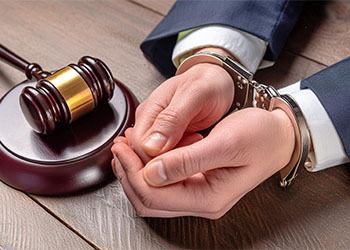Strategies for Building a Strong Defense in Criminal Cases
Oct. 20, 2025
 When someone is accused of a crime, it can feel like the weight of the justice system is pressing down before they’ve even had the chance to speak. The fear of jail, financial stress, and uncertainty about the future often leave people feeling overwhelmed. It’s a time when every decision matters, and the path forward isn’t always clear.
When someone is accused of a crime, it can feel like the weight of the justice system is pressing down before they’ve even had the chance to speak. The fear of jail, financial stress, and uncertainty about the future often leave people feeling overwhelmed. It’s a time when every decision matters, and the path forward isn’t always clear.
At The Hardin Law Firm LLC, I know how important it is to take control of that situation. As a criminal defense lawyer serving clients in St. Louis, Missouri, and the surrounding areas, I work to protect rights and build strong strategies that give clients a fighting chance.
If you or someone close to you has been charged with a crime, reach out to me today and start building a defense that safeguards your future.
Break Down the Charges Thoroughly
A strong defense starts with a careful review of the charges. Missouri law is detailed, and even a small distinction in how an offense is classified can mean the difference between a misdemeanor and a felony. Penalties, sentencing guidelines, and collateral consequences all hinge on those details.
A criminal defense lawyer breaks down each charge to see whether the prosecution can prove every element. This detailed review often reveals weak points that may become central to the defense. Without this first step, important opportunities could be missed.
Investigate Beyond the Police Report
Police reports often tell only one side of the story. Errors, assumptions, or missing context can shape how charges are filed. That’s why an independent investigation is so valuable.
A criminal defense lawyer investigates the facts beyond what the prosecution presents. This may involve:
Interviewing witnesses: Speaking directly with people who saw or heard what happened provides context often missing from police reports.
Reviewing video or audio evidence: Surveillance footage, body cameras, or phone recordings may support the defense.
Visiting the scene: Examining the location firsthand can uncover details that contradict the state’s version of events.
Consulting professionals: Experts in fields like forensics, medicine, or ballistics can provide insights that challenge the prosecution’s claims.
When an investigation uncovers new evidence, it strengthens the defense and highlights weaknesses in the state’s case. A criminal defense lawyer knows how to use those discoveries effectively in court.
Challenge Evidence and Police Procedures
Evidence is the backbone of any prosecution. However, just because evidence exists doesn’t mean it’s admissible. The Constitution protects people from unlawful searches, seizures, and interrogations. If police or investigators violate those protections, the evidence may be excluded.
A criminal defense lawyer looks at every step of how the evidence was gathered. Was there a valid warrant? Did the police have probable cause? Was a confession taken without proper Miranda warnings? If procedures weren’t followed, that evidence can be challenged. Suppressing even one piece of key evidence may weaken the prosecution’s case significantly.
Consider Options for Negotiated Outcomes
Not every case goes to trial, and for some clients, negotiating a resolution is the best option. Plea deals can reduce charges, limit penalties, or provide alternatives to incarceration such as probation or treatment programs.
As a criminal defense lawyer, I help clients weigh the benefits and risks of accepting a plea. This includes analyzing the strength of the prosecution’s case, the potential sentence at trial, and the client’s long-term goals. While no one should feel pressured into a deal, a fair agreement can sometimes provide stability and certainty in an otherwise uncertain process.
Prepare for the Realities of Trial
If a case proceeds to trial, preparation is everything. A trial isn’t just about presenting facts—it’s about persuading a judge or jury. That requires strategy, organization, and confidence in the courtroom.
A criminal defense lawyer prepares by:
Developing a clear theory of defense that ties the facts together.
Drafting strong opening statements and closing arguments.
Preparing cross-examinations to highlight inconsistencies in witness testimony.
Selecting the right exhibits to illustrate points effectively.
Anticipating the prosecution’s arguments and planning counterpoints.
This level of preparation builds credibility and gives the defense the best possible chance at securing a favorable verdict.
Select Jurors With Care and Confidence
In jury trials, selecting the right jurors can be as important as presenting evidence. Both sides have the opportunity to question jurors and request that some be dismissed if they show bias. An experienced criminal defense lawyer uses this process to identify people who may be open to hearing the defense fairly.
During the trial, how the defense interacts with jurors also matters. Clear communication, confident presentation, and consistency in the story all help build trust. Jurors who believe the defense is credible are more likely to give serious weight to the arguments presented.
Strengthen the Case With Character Evidence
In many cases, who the defendant is outside of the charges can influence the court’s perspective. Demonstrating good character can help balance the narrative presented by the prosecution.
This may involve letters from employers, testimony from community members, or evidence of volunteering and community involvement. A criminal defense lawyer advises clients on when and how to present this evidence effectively. The goal isn’t to distract from the charges but to show the full picture of the defendant’s life.
Apply Defense Strategies That Fit the Facts
Defense strategies vary depending on the facts of each case. Some of the most common approaches include:
Challenging identification: Mistaken identity is more common than people realize. Eyewitnesses often misidentify suspects.
Questioning credibility: Witnesses may exaggerate, lie, or simply remember events incorrectly.
Highlighting lack of proof: The prosecution must prove guilt beyond a reasonable doubt, and any gap in evidence matters.
Using expert testimony: Specialists in forensics, toxicology, or mental health can counter prosecution claims.
Arguing constitutional violations: When rights are violated, evidence obtained as a result may be excluded.
Each case is unique, but these strategies often provide the foundation for building a strong defense. A criminal defense lawyer determines which options fit best with the client’s circumstances.
Address Collateral Consequences Early
Criminal cases don’t only carry immediate penalties. Convictions can affect employment, housing, professional licenses, and even immigration status. For many people, these collateral consequences are just as damaging as the sentence itself.
A criminal defense lawyer considers these factors when shaping a defense. For example, negotiating a plea to a lesser charge may avoid certain licensing restrictions. By thinking beyond the courtroom, the defense strategy protects the client’s future, not just the outcome of the trial.
Keep Clients Engaged in the Defense
Building a defense isn’t just the lawyer’s work—it requires the client’s input as well. Sharing accurate details, providing documentation, and communicating openly with the lawyer help create a stronger case.
As a criminal defense lawyer, I encourage clients to stay engaged and proactive. By working together, the lawyer and client build trust and prepare more effectively for court.
Advocate for Fair Sentencing Options
Even if a case results in a conviction, the defense doesn’t stop. Sentencing hearings give the defense a chance to argue for reduced penalties or alternative options. Judges often consider mitigating factors such as employment history, family responsibilities, or efforts at rehabilitation.
A criminal defense lawyer presents these factors effectively, sometimes through testimony or documentation. By showing that a client has taken steps to improve their life, the defense can advocate for probation, treatment, or community-based alternatives instead of harsher punishment.
Explore Post-Conviction Relief When Needed
If the trial doesn’t go as hoped, there may still be options. Appeals, post-conviction motions, and requests for sentence modifications are all tools available for use. These processes are different from the original trial but can still provide relief.
A criminal defense lawyer evaluates whether errors were made during trial, whether new evidence has surfaced, or whether sentencing laws were applied incorrectly. Post-conviction advocacy ensures that clients don’t lose hope after an initial decision.
Criminal Defense Advocacy
Being accused of a crime is one of the most stressful challenges a person can face, but it’s not the end of the story. With the right defense, there are always opportunities to push back against the prosecution and fight for a better future.
At The Hardin Law Firm LLC, I work with clients in St. Louis, Missouri, and the surrounding areas to build defenses that reflect their circumstances and goals. As a criminal defense lawyer, I am dedicated to protecting rights at every stage of the process. If you’re ready to take the next step, reach out to me today, and let’s talk about how to defend your case.
